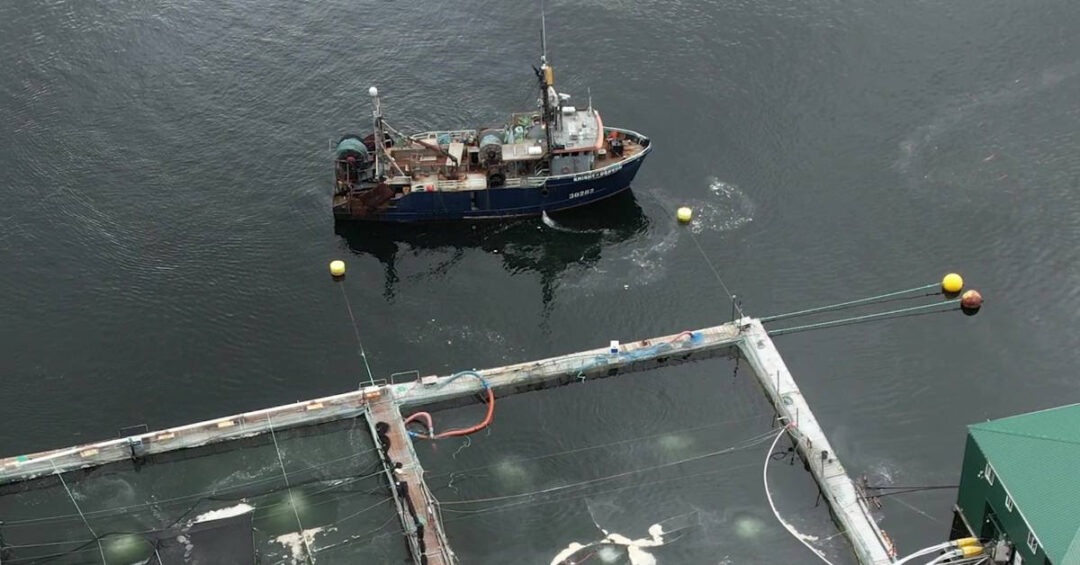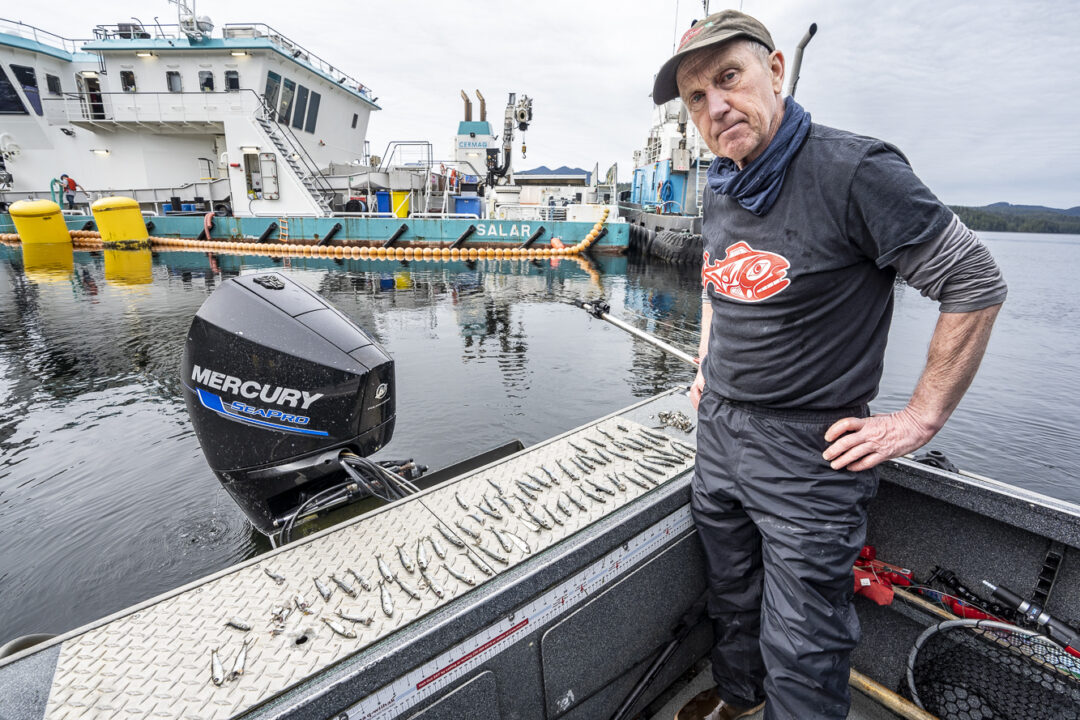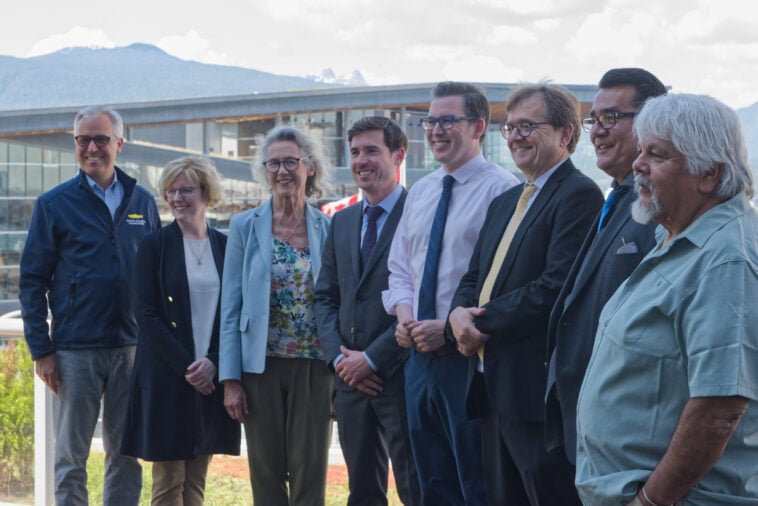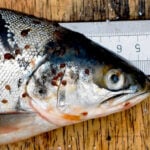The federal government has finally released its much-delayed transition plan to remove open-net pen salmon farms from BC waters. The new plan, presented at a press conference on June 19 in Vancouver by Jonathan Wilkinson, Minister of Energy and Natural Resources, on behalf of Diane Lebouthillier, Minister of Fisheries and Oceans, will extend salmon farming licenses and give industry another five years to close their operations.
Open-net pen farms have been highly controversial in BC waters, as a wealth of scientific evidence has proven that salmon farms breed parasites and diseases that transfer to wild smolts, putting already-endangered wild salmon populations at risk.
“We know that open-net pen salmon farming does amplify and release parasites and alien diseases into our ocean waters, infecting Pacific salmon, particularly juvenile salmon on their migration routes.”
Former Fisheries Minister Joyce Murray
“Today we are announcing the next phase in the transition away from open-net pen aquaculture, to which this government committed to in 2019,” said Wilkinson at the conference, alongside former Fisheries Minister Joyce Murray, MP Terry Beech, Chief Bob Chamberlin, chair of the First Nation Wild Salmon Alliance, and others.
“I want to reflect clearly on how important it is that we continue to engage meaningfully and thoughtfully with First Nations partners and communities as we move forward,” Wilkinson said.
“It is vital that we work together to find pathways towards ensuring economic impacts of the transition away from open-net pens are mitigated, and that we incentivise this transition in a way that promotes wild fish health, reconciliation with coastal First Nations, economic development, food security, and other important outcomes,” he said.
“On the Pacific coast, people are deeply worried about wild salmon, whose numbers have plunged in the last fifty years – almost 90 percent,” said Murray. “We know that open-net pen salmon farming does amplify and release parasites and alien diseases into our ocean waters, infecting Pacific salmon, particularly juvenile salmon on their migration routes.”
“This transition is an opportunity to build sustainable economic alternatives with affected communities and to support our government’s critical work and rebuilding vital salmon stocks and fisheries throughout,” she said.
The transition plan was leaked earlier this week when The Globe and Mail reported that BC salmon farms would be given until 2029 to complete the transition to land-based farming. An unnamed senior official told the publication that the five-year extension “demonstrates that Ottawa is being responsible in helping the $1.5-billion salmon fishing industry adapt to a land-based operation.”
“I wish open-net farms could be removed much sooner. Our wild stocks don’t have time to wait. I look forward to seeing more details and rigour and legal teeth in the phase-out to ensure open-net salmon farms are gone.”
Stan Proboszcz, Senior Science and Policy Analyst at Watershed Watch Salmon Society
In addition to the five year extension, the government today announced that they would introduce nine-year licenses for closed containment salmon farm operations, either “marine or land-based” – though did not clarify whether this included semi-closed aquaculture salmon farming.
Feds Backtrack 2019 Promise
In 2019, the Liberals originally committed to removing open-net fish farms from BC waters by 2025, out of concern for the health of wild fish populations. The government then backtracked on that commitment, saying it would instead release a transition plan for the open-net pen farms by the 2025 deadline.
Many environmental, fisheries and Indigenous advocates have vocally opposed the extension of fish farm licenses but are happy to see the release of the long-awaited transition plan.
“I think this is a good step forward from the federal government to removing open-net salmon farms from BC,” said Stan Proboszcz, Senior Science and Policy Analyst at Watershed Watch Salmon Society. “It shows they are committed, though I wish open-net farms could be removed much sooner. Our wild stocks don’t have time to wait. I look forward to seeing more details and rigour and legal teeth in the phase-out to ensure open-net salmon farms are gone,” he added.

“It shows there is a demonstration of leadership to fully embrace legislative tools to safeguard the environment and the salmon,” Chief Bob Chamberlin, chair of the First Nation Wild Salmon Alliance, told The Globe and Mail on Sunday. However, he also voiced concern for the long-phase out period that has been extended to the aquaculture industry in BC.
Advocates for salmon farming like the BC Salmon Farmers Association (BCSFA) are already speaking out against the transition plan and the expectation to transition to land-based operations. “The plan forward communicated in this article does not reflect a ‘realistic, responsible and achievable’ approach to a transition, as Minister Lebouthillier has publicly stated,” the BCSFA said in a statement.
Fish Farm Die-Offs
The announcement comes amidst reports of fish death and illness events at BC fish farms. Earlier this month, a die-off event at salmon farms in Nootka Sound left an unknown and concerning discharge in the waters where wild salmon breed. Proboszcz with Watershed Watch Salmon Society personally witnessed plumes of white material being released into Nootka Sound waters, which he believes is connected to lice-related deaths at Grieg Seafood fish farms.
Fisheries and Oceans Canada (DFO) later confirmed to The Skeena that three out of five Grieg facilities in the area reported significant mortality events, the highest being 23% of the stock dead at one farm over a ten-day period. Sea lice numbers were as high as ten times the accepted threshold per salmon at certain Grieg salmon farms.

In December of last year, DFO released a report that showed over 817,000 wild fish, mostly herring, were killed due to open-net pen salmon farm operations near Tofino. Cermaq Canada – whose farming licenses had just been expanded by DFO – was responsible for a significant number of these herring deaths through their farming activities in Clayoquot Sound.
“I think it’s safe to say the social license for those [open-net pen fish farms] that just sit in the ocean and cause the death of other fish in British Columbia, has expired,” said BC Premier David Eby, at a press conference addressing the Cermaq fish deaths.
DFO Bureaucrats Under Fire
DFO bureaucrats are currently under investigation for claims that they have been silencing scientists from communicating publicly about their findings regarding BC fish farms. Harriet Solloway, the Public Sector Integrity Commissioner, is leading the inquiry and has promised she will look into DFO officials’ attempts “to silence scientists through reprimands [and] to dissuade them from communicating with the media and public about their research,” according to documents obtained by The Globe and Mail.
“This is an archaic industry, and our neighbours have already taken action to remove Atlantic salmon farming. What are we waiting for? Let’s get on with it.”
Stan Proboszcz, Senior Science and Policy Analyst at Watershed Watch Salmon Society
The concerns were brought forward by Tony Allard, chair of Wild Salmon Forever, a BC-based conservation organization. If found to be true, DFO officials would be in violation of the Values and Ethics Code for the Public Sector and DFO’s Policy on Science Integrity.
BC is the only region along the Pacific to still have fish farms in its coastal waters. West coast states including Alaska, Washington, Oregon, and California have all banned commercial open-net salmon farms.
“This is an archaic industry, and our neighbours have already taken action to remove Atlantic salmon farming. What are we waiting for? Let’s get on with it,” said Proboszcz, in an interview with The Skeena last week.




